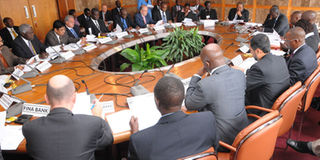Government to borrow Shs672b to stabilise the Shilling

Bank of Uganda governor Emmanuel Tumusiime Mutebile chairs a meeting recently. File Photo
What you need to know:
Depreciation. Government is to borrow Shs672 billion to fix the exchange rate.
Kampala.
Government wants to borrow $200 million (Shs672 billion) from the Eastern and Southern African Trade and Development (PTA) Bank to “stabilise the exchange rate”.
The money will be used to skirt around the need to go to Bank of Uganda for US dollars for some imports.
Shs672 billion is 2.8 per cent of the 2015/16 Fiscal Year budget or 6.7 per cent of Uganda’s current foreign exchange reserves.
“We negotiated with the PTA Bank to give us a revolving facility for foreign exchange,” Mr Matia Kasaija, the Minister for Finance, told Daily Monitor yesterday.
“For example, if the National Medical Stores needs $40 million to import drugs, rather than go to the Bank of Uganda to get dollars, the PTA Bank will pay the suppliers abroad.”
Mr Kasaija said this would lessen the pressure on Bank of Uganda to release more dollars to pay for Uganda imports.
In the first three quarters of this year, the Shilling was depreciating fast, against the US dollar; at one time, one needed Shs3, 700 to get one US dollar, up from Shs2, 700 in 2014.
Some analysts attributed this to the low volume of Uganda’s exports vis–à–vis imports, low remittances by Ugandans living in the Diaspora and the hoarding of dollars by some speculators hoping to cash in on the depreciation of the Shilling.
The depreciation prompted Bank of Uganda in the first two quarters of this year to release $200m into the market to shore up the Shilling. As calls for more intervention increased, the Bank of Uganda governor, Dr Emmanuel Tumusiime–Mutebile, said this was not sustainable.
Foreign exchange
Uganda has foreign exchange reserve stock of $2.9 billion (Shs9.9 trillion), which, the Finance minister said in June, is equivalent to “four months of Uganda’s future imports
The country’s exports, as at March 2015, were equivalent to $2.701 billion (Shs9 trillion) whereas her imports were valued at $5 billion (Shs16.975 trillion).




